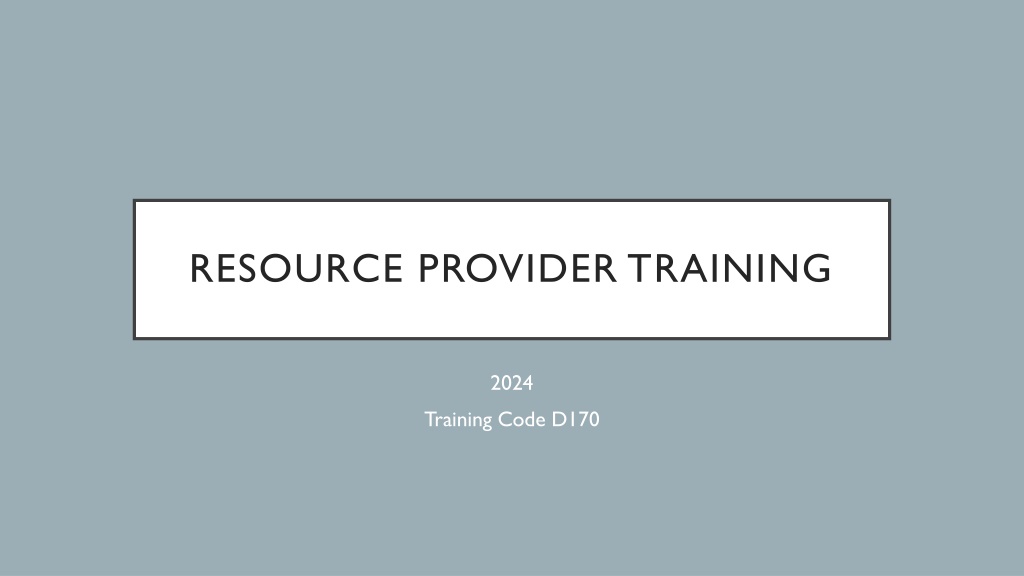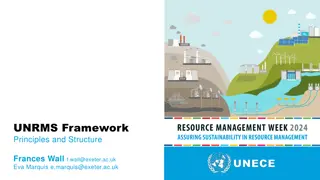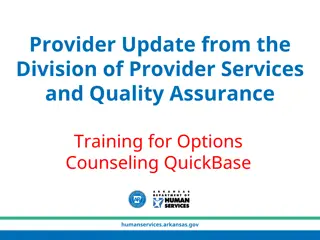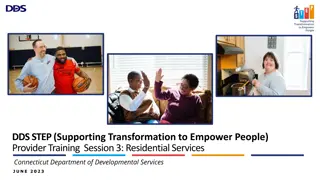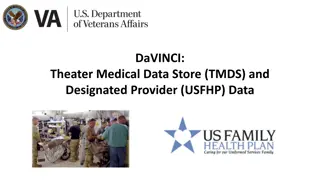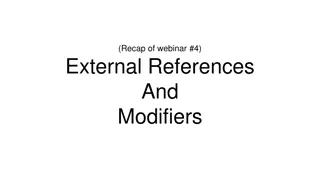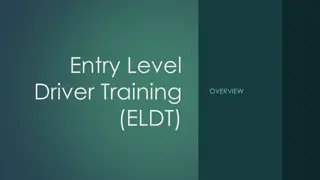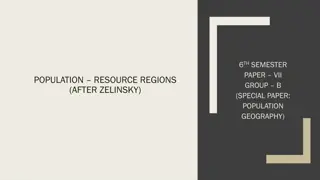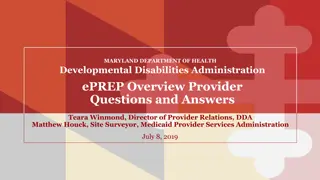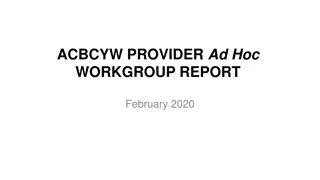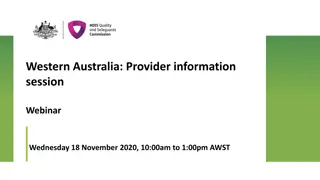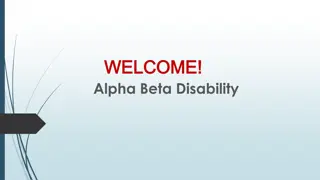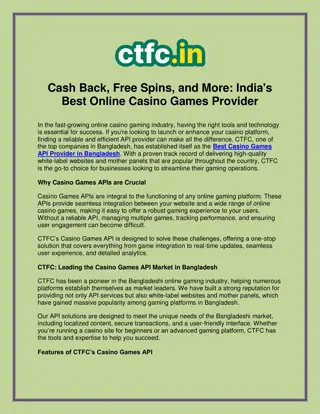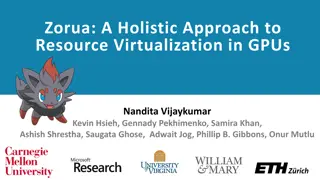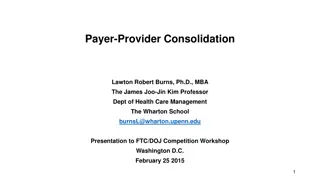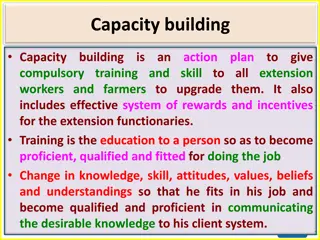Resource Provider Training Overview
Providing detailed information on medical needs, routine vs. non-routine treatment, screenings vs. examinations, initial health exams, full HCY screenings, and ongoing medical assessments for children in custody. Ensuring comprehensive healthcare services are delivered effectively and efficiently.
Download Presentation

Please find below an Image/Link to download the presentation.
The content on the website is provided AS IS for your information and personal use only. It may not be sold, licensed, or shared on other websites without obtaining consent from the author.If you encounter any issues during the download, it is possible that the publisher has removed the file from their server.
You are allowed to download the files provided on this website for personal or commercial use, subject to the condition that they are used lawfully. All files are the property of their respective owners.
The content on the website is provided AS IS for your information and personal use only. It may not be sold, licensed, or shared on other websites without obtaining consent from the author.
E N D
Presentation Transcript
RESOURCE PROVIDER TRAINING 2024 Training Code D170
OVERVIEW Medical Needs/Requirements Overview Forms Informed Consent Alternative Consenter Pharmacy Information
ROUTINE VS. NON-ROUTINE TREATMENT ROUTINE (STANDARD) MEDICAL TREATMENT INCLUDES, BUT IS NOT LIMITED TO: NON-ROUTINE TREATMENT INCLUDES, BUT IS NOT LIMITED TO: Ordinary illnesses Surgery Routine dental care Inpatient hospitalization Immunizations Behavioral therapy Well child visits Behavioral health services Preventative health services Psychiatric treatment Ongoing treatment and testing for chronic medical conditions such as asthma, diabetes and ear infections Psychotropic medication
SCREENING VS. EXAMINATION SCREENING EXAMINATION Screenings are performed as part of a comprehensive assessment (Healthy Child and Youth (HCY) exam or well child check). These screenings are performed by a primary care professional or other appropriately trained professional. They look for any problematic issues and provide guidance on how to address them. Exams are completed by a specialist in the particular field. (dentist, optometrist, audiologist, ect). Exams incorporate a more thorough assessment.
INITIAL HEALTH EXAM An initial exam should occur within 24 hours of the child coming into care. When possible, this should be completed by the current primary care physician as they are already familiar with the child s medical history. If a provider is not readily accessible this exam must occur within 72 hours of initial placement. The case manager does not need to attend this exam; however, they should receive documentation of the results and ensure compliance with any recommended follow up treatment.
FULL HCY SCREENINGS A full Healthy Children and Youth Screening consists of a physical exam and other developmental components, including but not limited to vision, hearing, social/emotional and dental screenings. The screening shall be completed no later than 30 days after the child is placed in CD custody. An initial health examination may be considered a full HCY screening if the initial health examination contains the elements required for an HCY exam.
ONGOING MEDICAL ASSESSMENTS All children in the custody of the Children s Division shall receive medical assessments in accordance with the Bright Futures /American Academy of Pediatrics (AAP) Recommendations for Preventive Pediatric Health Care also known as the Periodicity Schedule. The periodicity schedule is based on age and may require some children to have more frequent visits than children in other age groups. https://downloads.aap.org/AAP/PDF/periodicity_schedule.pdf
DENTAL EXAMINATIONS Immediately following placement the resource provider should obtain a dental examination for the child as recommended by the dentist or every six (6) months; but at least annually. First Dental Exam:The American Academy of Pediatric Dentistry (AAPD) recommends the first dental examination occur at the time of the child s first tooth eruption, or no later than 12 months of age. Ongoing Dental Exams: Dental exams are recommended every six (6) months, or more frequently if recommended by the dentist based on the child s risk status.
MEDICAL FORMS CW 103 Child/Family Health and Development Assessment CD 264 Health Care Information Summary CD 265 Monthly Medical Log CD 275 Informed Consent for Psychotropic Medication
CW 103 CHILD/FAMILY HEALTH DEVELOPMENT ASSESSMENT Provides detailed past medical history for child and parents. Gives a starting point in obtaining a medical history on a youth. Provides information on past medications and medical events as applicable. Ideally this form is completed by the child s parents when the child initially enters care. A copy of the CW 103 should be given to the resource provider within 30 days of a child s initial placement into foster care and within 72 hours for subsequent placements. Subsequent placements should receive an updated form.
CD 264 HEALTH CARE INFORMATION SUMMARY Provides current information about the child s medical providers, medications/dosages, and upcoming medical appointments. Communicates to the resource provider about important health information about the child. Provides a summary of important medical information when a child changes placements. It is the responsibility of the case manager to complete this form. A copy of the CD 264 should be given to the resource provider within 72 hours whenever possible but not later than 30 days following for a child s first placement. An updated copy of the CD 264 should be provided to the resource provider within 72 hours for all placement changes.
CD 265 MONTHLY MEDICAL LOG The CD 265 was created to assist the resource provider in documenting health related needs, informed consent decisions for routine care, medications, and appointments regarding the child. The CD-265 also offers an opportunity for the resource provider to provide information about the child s progress and needs related to the child s health. It is the responsibility of the resource provider to complete this form monthly and submit to the case manager monthly, primarily during the case manager s visit with the child in the child s placement. Copies of all previously completed CD 265 s are to be give to any subsequent resource providers within 72 hours of placement.
CD 265 CONTINUED The log should record illnesses, medical events, and all medications administered (the amount given) to the child. Visits to physicians/therapists (if applicable), the purpose of the visit and any upcoming appointments. The form needs to be completed in its entirety each month. Resource providers should record the child s weight and date the weight was taken each month. The child can be weighed on a home scale. This information is required to determine if medication dosages are excessive or not and if a review is needed from the Center For Excellence.
FREQUENTLY ASKED QUESTIONS Do I need to fill out the CD-265 every month if there are no appointments? YES! It is your responsibility to make sure the CD-265 is updated monthly even if there is no new information o Who can I contact if I have questions completing the CD 265? You can contact the youth s case manager, your licensing worker or a Health Information Specialist o How often does the CD 265 need to be completed and sent to the case manager? Every child, Every month forms need to be filled out or updated and sent to the case manager o
MEDICAL CONSENT Medical Consenter is a person who makes medical decisions for a child in CD custody. When a child is in state custody, resource providers can give permission for any routine medical treatment for a child in their care, like: Preventative care Dental appointments Immunizations
MEDICAL CONSENT CONTINUED The Children s Division must give permission for anything beyond routine care, like: Surgeries Hospitalizations Certain dental procedures Medical testing Behavioral therapy Psychiatric treatment (including psychotropic medication prescriptions)
INFORMED CONSENT Agreement to any medical or behavioral health treatment Decision is made based on what is best for the child without undue influence Children s Division case manager is the consenter for behavioral health care for children in care. Decision can only be made after the following: Having the opportunity to consider the risks and benefits of the recommended treatment. Engaging the youth and parent(s) in the decision Determining if a secondary or mandatory review is needed
ALTERNATIVE CONSENTER Any member of the child s Family Support Team can ask to give permission (consent) for a child s medical care, including psychotropic medication. This includes the child s resource provider. The interested person would contact the child s case manager. Children s Division may ask for the request in writing. Children s Division will let the court know of the request as soon as they are able and ask that the interested person have a chance to be heard by the court. The final decision granting someone as an alternative consenter lies with the court.
RESOURCE PROVIDER RESPONSIBILITIES Provide the case manager a summary of the child s medical care. Give regular updates on the child s medical and behavioral health. Complete the Monthly Medical Log (CD-265) Inform the case manager promptly about any serious medical condition. Promptly communicate about changes in the psychotropic medication dosage prior to administration.
CASE MANAGER RESPONSIBILITIES PRIOR TO INFORMED CONSENT Prior to beginning a psychotropic medication for youth in care, case managers shall: Ensure the youth is utilizing non-pharmacological interventions such as therapy, skills building, sleep hygiene, etc. Ensure the youth has had a mental health assessment, with a DSM-based diagnosis, documented in the case record. Attend the initial appointments for psychiatric assessment or care Obtain necessary information regarding the prescribers recommendation for treatment.
CASE MANAGER RESPONSIBILITIES ENGAGING THE PARENTS Contact parents to have a conversation about the recommended treatment such as diagnosis, purpose, names and dosage, possible side effects, required follow up or monitoring, availability of alternatives, prognosis without an intervention and prescriber contact information. Provide parents with Learn Your Rights Parent flyer (CD 287) At least 2 attempts on different days (may occur within 24 hours) and should be by at least 2 methods (phone, email, in person, etc).
CASE MANAGER RESPONSIBILITIES ENGAGING THE YOUTH Ensure all youth are informed, in an age and developmentally appropriate manner, of the prescribers recommendation. Case managers need to obtain informed assent (agreement) with the recommended medication or treatment for youth 12 and older. Provide Learn Your Rights (youth flyer) CD 281to youth 12 and older. Provide Learn Your Rights CD 281 to the child s attorney/GAL for youth of any age. Ensure the youth has had the opportunity to voice questions or concerns privately with the health care provider. Continue to engage the youth on an ongoing basis to monitor progress.
CASE MANAGER RESPONSIBILITIES REVIEWS AND RECOMMENDATIONS After engaging the parents involved and the youth regarding the recommended medication, the next step is to determine if a Secondary or Mandatory Review to the Center For Excellence is necessary. Recommendations shall be provided to the parents or legal guardian, the alternative consenter if applicable, child s resource provider and any other persons authorized by the court to receive the recommendations within 3 business days. Recommendations may be provided to other individuals as appropriate such as: GAL, CASA, FST members, medical providers. Case manager should submit a request for a secondary review if a member of the child s Family Support Team makes such a request. Resource providers would contact the child s case manager to request a review be completed.
PHARMACY INFORMATION What should you do if a medication you are trying to get filled at the pharmacy is denied by MO HealthNet? Do not have anyone pay out of pocket or assume the medication can be obtained. Medications may be denied for concerns of serious health risks to the child. The case manager as well as the resource provider can call the MO HealthNet Pharmacy Administration Unit for more information about why the medication was denied and how the situation may be resolved: 573-751-6963, option 3. For non urgent questions email MHD.PharmacyAdmin@dss.mo.gov If these options have been tried and additional assistance is still needed the child s case manager can reach out to the CD MO HealthNet liaisons.
SCENARIOS What if you take a child to the doctor and psychotropic medication is recommended? What should you do when a child refuses to take their medication? What if a child enters care on medications?
HEALTH INFORMATION SPECIALIST The Children s Divisions Health Information Specialist (HIS) Unit provides support with everything medical and behavioral health related for children in our care. One important role of the HIS is to gather information and submit referrals to the Center For Excellence when a review is required. At times, the HIS may reach out to the resource provider directly to gather important information such as a list of the child s current medications, current weight or where recently lab work was completed.
